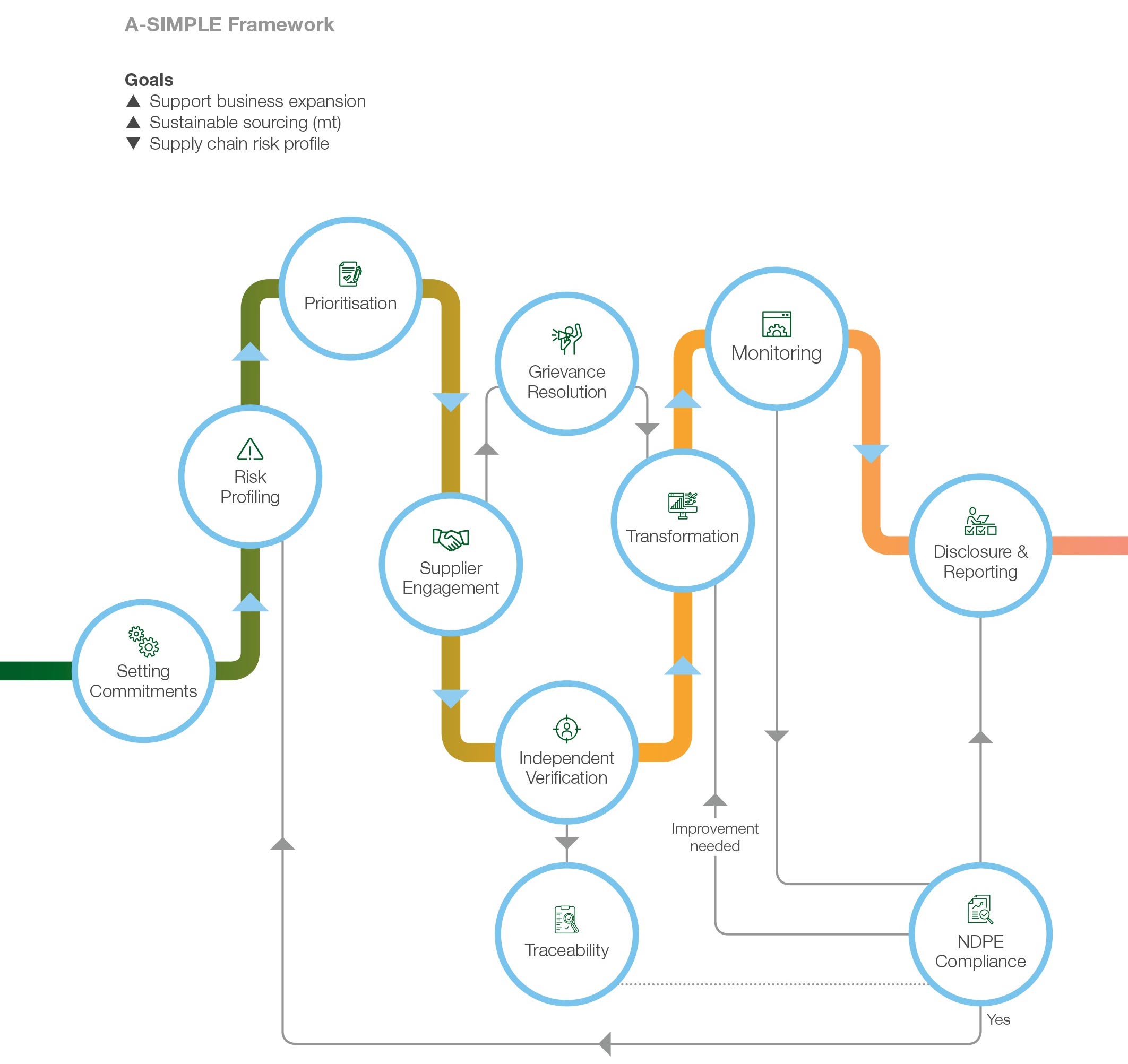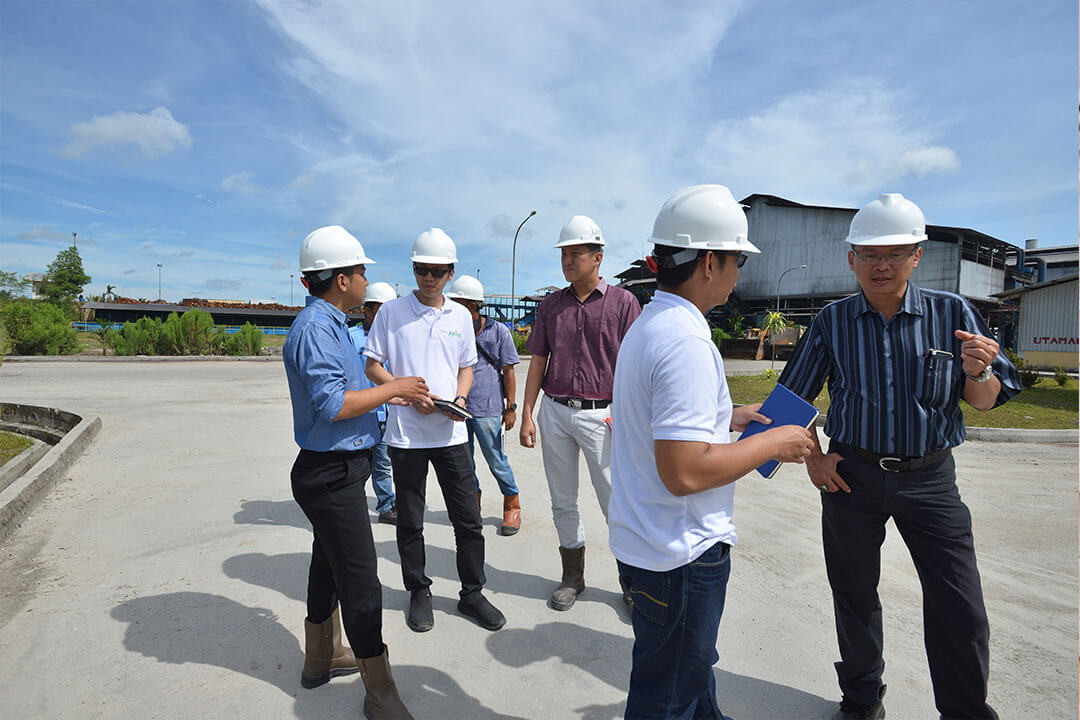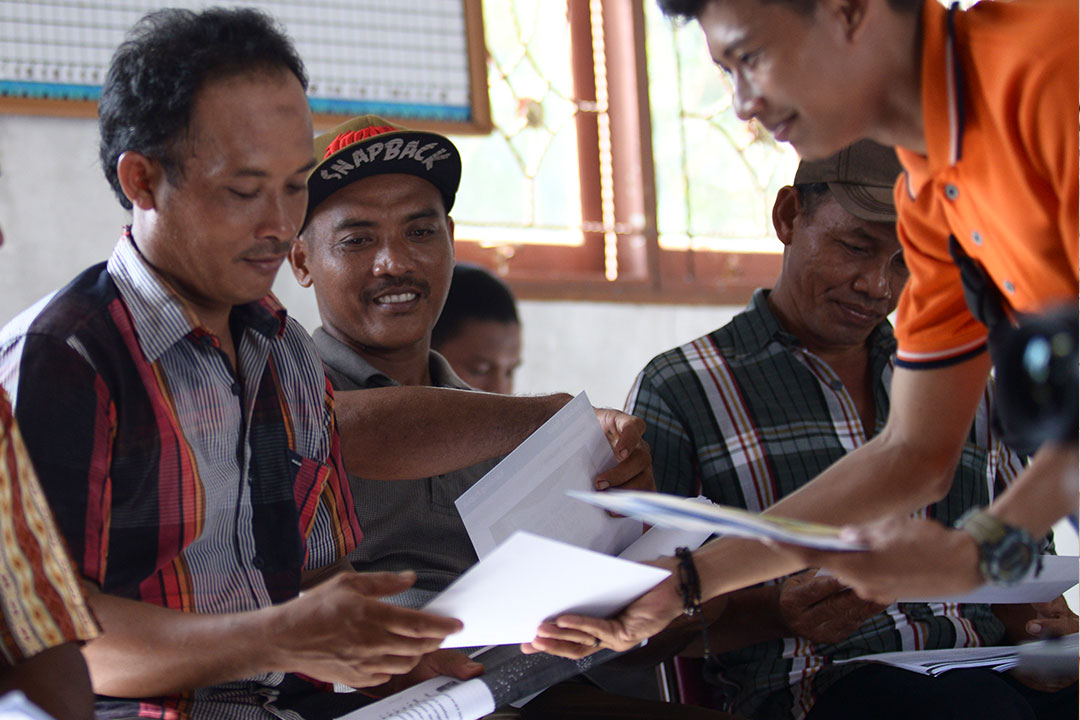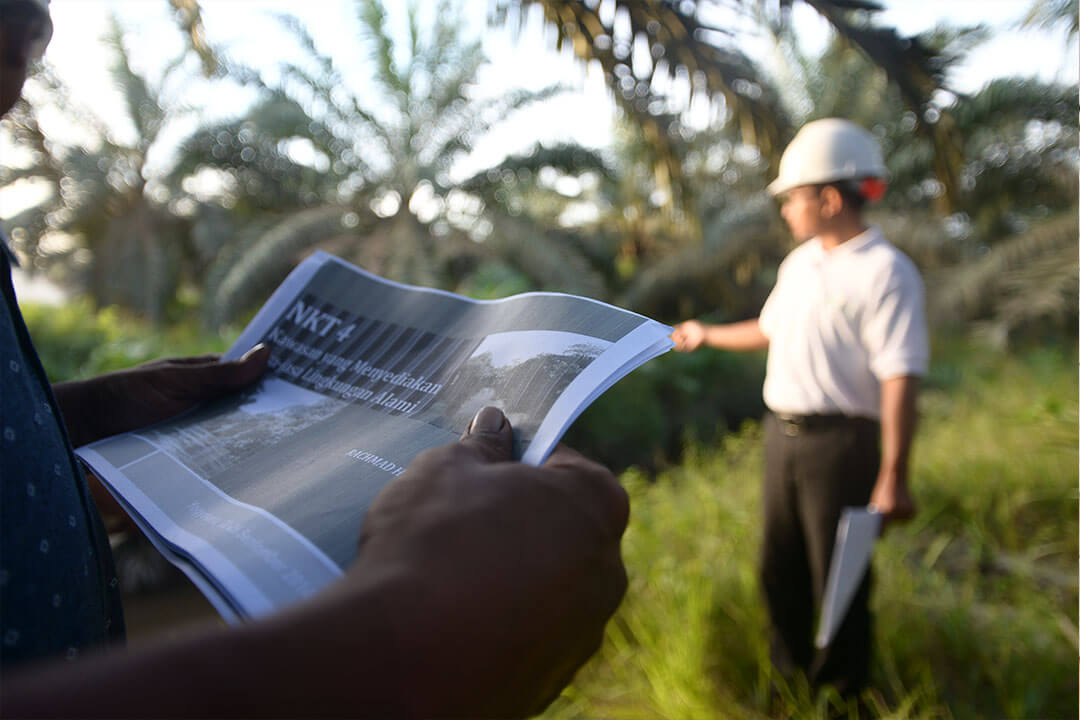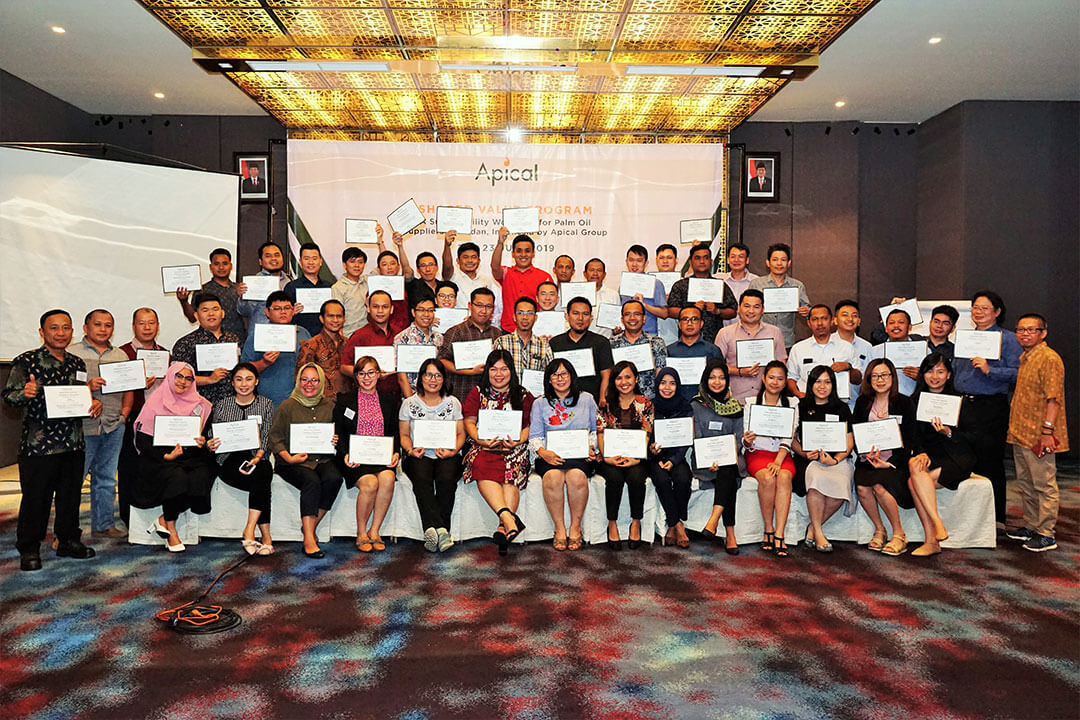Sustainability Policy
Our enhanced Sustainability Policy 2023 marks a significant leap forward in our journey to fuel transformative change towards a sustainable and deforestation-free supply chain. Since its initial launch in September 2014, we have remained steadfast in our commitment to adopting sustainable practices and being a responsible corporate citizen. Our Policy outlines our commitment to ensure that sustainable practices are implemented throughout the entire value chain of our palm oil production, from cultivation to processing and delivery to end-users.
Our Commitments
Apical is committed to building a traceable, sustainable and deforestation-free palm oil supply chain.
-
- Stronger No Deforestation, No Peat, and No Exploitation (NDPE) commitments for suppliers to comply with the December 2015 cut-off date
- Commitment to combatting climate change aligned with the 1.5°C global warming target set out in the Paris Agreement through Apical2030 roadmap
- Committed to preserving and enhancing biodiversity in landscapes and supply chains
- Committed to upholding international human rights standards across our operations and supply chain
- Committed to continuously fostering inclusivity by supporting smallholders
- Prioritising accountability across the supply chain by ensuring commitment from suppliers
- Proactively align to emerging sustainability regulations
This commitment extends to all of Apical’s operations worldwide. It covers our own operations, joint ventures, subsidiaries and direct and indirect suppliers in our palm oil supply chain. We will work to ensure that our suppliers, business partners and employees comply with the above commitments, local laws and regulations.
Our commitments are outlined in our Sustainability Policy 2023. For more information, please refer to our Sustainability Policy document.
Download the Apical Sustainability Policy
Human Rights Policy
We are committed to ethical and responsible corporate citizenship, and as part of that commitment, we have introduced a Human Rights Policy. This Policy aligns with international human rights standards and ensures that the fundamental human rights of workers and communities are upheld. The Human Rights Policy goes hand in hand with the Sustainability Policy 2023 and reaffirms our commitment towards addressing human rights within our operations and supply chain.
Our Commitments
Apical is committed to respecting human rights of workers and communities
- Committed to respecting all internationally recognized human rights across our global operations and supply chains, ensuring ethical and responsible business conduct
- Committed to respecting rights of workers
- Respect the rights of indigenous peoples and local communities
- Respect the rights of Human Rights Defenders to raise concerns and pledge to address any harmful impacts towards them caused by our operations or supply chain, in accordance with the United Nations Guiding Principles on Business and Human Rights
Our commitments are outlined in our Human Rights Policy 2023. For more information, please refer to our policy document.
Download the Apical Human Rights Policy
Sourcing Policy
It is important that our customers and consumers are confident that our products are made from palm oil that has been responsibly sourced from traceable and transparent supply chains that respect the environment and local communities.
Likewise, it is important that we work together with our valued suppliers to ensure that their produce enjoy wide acceptance and have unrestricted global market access.
This sourcing policy has been completed pursuant to the Apical Sustainability Policy (September 2014) to build a traceable and transparent palm oil supply chain.
Scope
This Policy covers all the internal and external operations within the Apical supply chain including refineries, palm oil mills, kernel crushing plants, plantations and smallholders.
Sourcing Strategy
Apical has committed in its Sustainability Policy to source palm oil supplies through a transparent network, traceable to the mills from which they come from.
Our sourcing strategy will focus on developing long-term relationships and understanding with all our suppliers. This Sourcing Policy will be implemented through:
Engaging our suppliers to ensure they are in compliance with our Sustainability and Sourcing Policy
Maintaining and updating our traceability database to the supplying mills and plantations
Ensuring that the company’s supplies come from legal sources and prevent encroachment on protected areas (natural forests/ HCS areas, national parks, etc.) in compliance with applicable legal requirements.
Details about our sourcing scope, strategy and sourcing from smallholders can be found in our Policy.
Download the Apical Palm Oil Sourcing Policy
Ensuring effective implementation
A-SIMPLE Framework
In 2020, we launched Apical Sustainability IMPLEmentation (A-SIMPLE) Framework. The framework is a mechanism for ensuring effective implementation of our Sustainability Policy to align with Apical’s sustainable business practices throughout our operations and supply chain. This is a critical and robust framework to help suppliers achieve supply chain transparency and ‘No Deforestation, No Peat, No Exploitation’ (NDPE) compliant.
The steps are foundational to Apical’s sustainability journey as we drive transformative change in the palm oil sector, primarily to reduce supply chain risks. Upon successful completion of these steps, we will have a reliable pool of sustainable source with low supply chain risk, thereby increasing confidence in buyers.
Read more
Setting commitment marks an important first step for Apical top level of management as we set the stage to integrate sustainability into the business operations and supply chain. To demonstrate our commitment, we launched Apical Sustainability Policy in 2014.
Based on the criteria in the Sustainability Policy, we establish risk profiles for all elements of our supply chain. At this Risk Profiling stage, risk-based approach Mill Prioritisation Process (MPP) uses remote sensing technology and non-spatial information by Apical’s in-house GIS specialist to assess the risk our supplier poses to Apical.
The risk profile is a towering factor of determination to identify suppliers to engage. Prioritisation stage is requisite to ascertain engagement with high-priority suppliers. Supplier Engagement will be conducted through a plethora of Anchor Programmes including deep engagement (Priority Supplier Engagement Program) and broad engagement (Shared Value Program, Traceability Outreach Program) approaches to drive supply chain transformation and NDPE compliant.
Supplier Engagement shows the level of commitment a supplier has to sustainability values. At this stage, any Grievance identified concerning palm oil supply chain has to undergo a robust Supplier Engagement and Grievance Procedure. Grievance Verification Team will investigate any alleged violation of our policy; any proven violation by suppliers must be resolved or remediated where appropriate. Grievance Steering Committee and Sustainability Director oversee all grievance related matters to ensure policy compliant.
Outcome of Anchor Programmes participation and grievance monitoring also contribute to Independent Verification against suppliers’ traceability level, especially on their NDPE compliance. Suppliers’ non-compliance require them to undergo Transformation initiative.
Successful positive changes from transformation initiative will be substantiated internally through technology-enabled services such as satellite Monitoring by our GIS specialist using Global Forest Watch (GFW) Pro, Global Land Analysis Discovery (GLAD) system, and independently monitored by Earthqualizer. Adoption of A-SIMPLE Framework help suppliers demonstrate fulfilment of supply chain transparency and ultimately results in a reduction of supply chain risk and contribution to positive impacts in social and environment.
The Disclosure of aspects of supply chain sustainability drive accurate Reporting (Global Reporting Initiative, in accordance) and leads to more ambitious sustainable actions – socially and environmentally.
Anchor Programmes
While traceability allows us to identify and map our suppliers all the way up to the plantation level, prioritisation and engagement with suppliers is crucial to ensure that the commitments and standards set out in our Sustainability Policy are met. Apical engages with suppliers through our flagship Anchor programmes to facilitate the adoption of more sustainable practices.
Check our progress dashboard to learn more about our achievements from these Anchor programmes.
Mill Prioritisation Process (MPP)
The MPP is a risk-based approach used to identify priority mills for deeper engagement. The process involves analysing geospatial and non-spatial parameters to identify potential sustainability risks associated with the supplying mills. Geospatial parameters identify risks linked to fire, deforestation, protected areas, and peatlands within a 50km radius of a supplying mill.
Non-spatial parameters focus on identifying issues related to communities, environmental, social, legal, and ongoing grievances that may occur in a mill’s FFB supply chain, based on publicly reported information from sources such as the media and external reports. High-impact suppliers that have long-term business relations with Apical are also prioritised for engagement. All of our suppliers are assessed under the MPP. Risk levels are updated monthly based on the parameters of the MPP.
Priority Supplier Engagement Programme (PSEP)
The PSEP assesses our high-risk suppliers, prioritised through the MPP, on their level of compliance with our Sustainability Policy and other industry standards. The assessment focuses on six key guiding principles. For suppliers in the PSEP, we will conduct field visits which allows us to have personal interaction and more effective communication. Deeper engagements facilitate a better understanding of our suppliers, provide new insights into their practices, and help to identify gaps for improvement.
The most common social issues identified include land conflicts resulting from the lack of Free Prior Informed Consent (FPIC) between the company and communities and the absence of clear land boundaries being defined. From an environmental perspective, most issues are centred on water and air pollution from the milling process. Deforestation and biodiversity issues are also identified and linked to mill operations.
Through our engagements, we provide detailed guidance on developing Standard Operating Procedures (SOPs) and sustainability management systems. After the PSEP visits, we continue to maintain a proactive relationship with these suppliers to ensure that action plans have been implemented and provide further assistance where required.
The PSEP is an ongoing process and while we aim to visit all the identified potential high-risk mills, our target is a minimum of 10 mills annually. Through our MPP and PSEP, we are able to minimise risks associated with our supply chain.
The assessment focuses on six (6) key guiding principles:
Traceability Outreach Programme (TOP)
Launched in 2017, the TOP is designed to provide knowledge and simplified solutions for the suppliers of our refineries on how to collect and manage the traceability data of their FFB suppliers. This programme takes an “outside-in” approach where suppliers are seen as co-contributors of solutions to make the industry more traceable.
This programme also has the ambition to verify and incorporate the data collected to build an interactive mapping platform to assist suppliers identify and manage landscape level issues based on the location of their FFB source.
Collaborative Action Remote Engagement (CARE)
Due to travel restrictions related to the ongoing COVID-19 pandemic, we launched the CARE programme in 2020 as a temporary replacement for PSEP. Through CARE, selected suppliers are required to perform a self-assessment verification to determine their compliance risk in the supply chain.
The verification is performed through an online platform which allows our sustainability team to conduct desktop analysis before engaging with the selected suppliers remotely. Following the verification, Apical develops action plan for suppliers with gaps in sustainability practices, including aligning with our NDPE commitments.
Online Verification → Review Document → Action Plan → Implemented and Follow-Up
Suppliers Self-Assessment (SFA)
A key component of the Apical Sustainability Policy is our commitment to NDPE which also applies to our suppliers. To ensure that NDPE practices are in place and risks within our supply chain are identified, Apical has developed the SFA tool to help our suppliers assess their own operations’ compliance with the requirements.
In 2019, we conducted a trial with some of our big and medium suppliers, as well as suppliers who only operate mills to test the usability of the tool. After the one-month trial and based on feedback obtained, we rolled out the SFA for all our suppliers who are required to fill up a questionnaire to identify gaps in practices against our Sustainability Policy commitments and areas of support needed to close those gaps. Where gaps are identified, we will then engage these suppliers through our PSEP and SVP programmes.
Shared Value Programme (SVP)
In partnership with Earthworm Foundation, Proforest and Daemeter, we deliver workshops through our SVP for our priority suppliers on a selection of topics that take into account regional issues specific to the location of suppliers. The SVP covers the latest market trends and benefits of international certification schemes such as RSPO and ISCC.
Participants gain insights into the importance of palm oil traceability and responsible sourcing. They are also updated on Indonesia’s regulations on peat, mill operations and plantations, as well as High Conservation Value (HCV) and High Carbon Stock (HCS) requirements. Industry subject matter experts from RSPO, Earthworm Foundation, Proforest, Daemeter, ISPO and Setara Jambi have previously shared practical knowledge and experience on these topics.
Aside from presentations by industry experts and partners, this programme promotes active discussions whereby suppliers take ownership of some of the solutions. We remain committed to conducting at least two workshops annually at different provinces in Indonesia. We introduced a Responsible Sourcing Manual (RSM) to our participants which aims to translate Apical’s Sustainability Policy into tangible and practical steps for implementation. The manual was published in 2018 and has been distributed to all our suppliers.
LATEST REPORT: 2023
Apical publishes its Sustainability Report annually based on Global Reporting Index (GRI) standards and externally verified data.
Read our latest Sustainability Report


